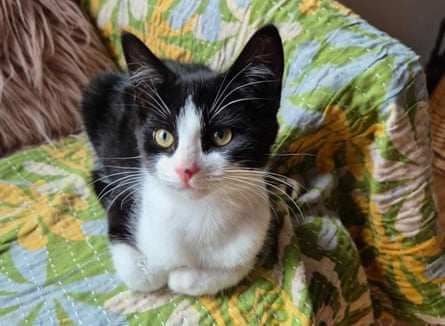Born and raised in Pakistan, Noreen Masud is a lecturer in 20th-century literature at Bristol University and an Arts and Humanities Research Council/BBC New Generation Thinker. In 2022 she published the academic monograph Hard Language: Stevie Smith and the Aphorism, and in 2023 A Flat Place (Hamish Hamilton). Part memoir and part travelogue through the UK’s flat landscapes, it was shortlisted for the Women’s prize for nonfiction, the Jhalak prize and the Ondaatje prize, as well as the Books Are My Bag Readers awards 2024, the winners of which will be announced on 12 November.
1. Project

Bristol, where I live, is one of Britain’s most unequal cities. So Bristol Redistro redistributes money from those with cash to spare to tiny community groups without other ways to raise it. Groups are selected for funding by a committee of those who’ve previously received it. The organisation’s beauty and brilliance lies in the way that it passes not only money to marginalised groups and communities, but the power to decide where it goes and where it will have an impact. Food distribution, mental health courses, education – small sums are life-changing for these projects.

2. Nonfiction
Daybreak in Gaza: Stories of Palestinian Lives and Culture edited by Mahmoud Muna and Matthew Teller with Juliette Touma and Jayyab Abusafia
At a fundraiser for Palestine earlier this month, Mahmoud Muna and Matthew Teller read from this collection of vignettes about the lives of Gazan people, during the violence of the past year as well as before it began, and the daily violence and humiliations of their existence under occupation. Muna and Teller read aloud an essay about a boy in a refugee camp who owns a rare asset: a mirror. People pay for a glimpse of their own faces. The silence in that hall, as they finished reading, was like glass. An extraordinary, vital, urgent book.
3. Exhibition
Friends in Love and War at the Ikon Gallery, Birmingham, until 23 February 2025

Friendship is vital and infuriating and impossible. So I loved this exhibition of art engaging with the concept, stuffed with fabulous artists such as Lubaina Himid and Tracey Emin. But my favourite pieces were by someone I’d never heard of: Kenneth Armitage. Armitage absorbed his metal figures into big cumbersome plates: the plates hold them together but also impede them, as they walk and sit and gesture. In Two Seated Figures (1952), you can feel the rhythm and hilarity of the two joined figures, leaning into each other, absorbed by each other, arm wide in the glee of storytelling.
4. Website
Forgotten Felines Cat Rescue on Facebook

My cat Morvern – hero of A Flat Place – died in August 2022, and nothing has been very interesting since. But I knew I was ready for another cat when I found myself checking the animal rescue websites in my area far more assiduously than the dating apps lying idle on my phone. My most regular haunt is Forgotten Felines Cat Rescue’s Facebook page, which has the tagline: turning hisses into kisses. It’s an amazing rescue service in Margam, south Wales, specialising in unpopular (disabled, feral, grumpy) cats. I’ve got my eye on two boys with feline immunodeficiency virus called Sam and Alfie. Together they weigh 10kg.

5. Poetry
Forest of Noise by Mosab Abu Toha
Since Israel targets, censors and blocks journalists from entering or operating in Gaza, the Palestinian people testify instead, again and again. If literature has any power to change the world or resist injustice, I think it must lie in the astounding poems of Mosab Abu Toha, whose new collection, Forest of Noise, is out on 7 November. The poem that broke me was The Ball and the Bombs, about missiles dropped on eight Palestinian children in 2014 while they were playing football on Gaza beach. Four were killed, four wounded. “The kids’ team wins,” concludes Abu Toha, deadpan with agony.
6. Place
Nullarbor Plain, Australia

I love it when readers of A Flat Place tell me about their own favourite flat landscapes: in Brazil, Turkey, South Africa, Italy. I don’t travel much beyond the UK so I admire these from afar on Google Images. But this December I’m going to Australia for work, and while I’m there I’m going to visit the Nullarbor Plain – a flatness of a kind I’ve never seen before. Perfect. The Eyre Highway runs through it: 146km of straight, unbending road. The pictures look so flat I want to cry and lie down and sing.
